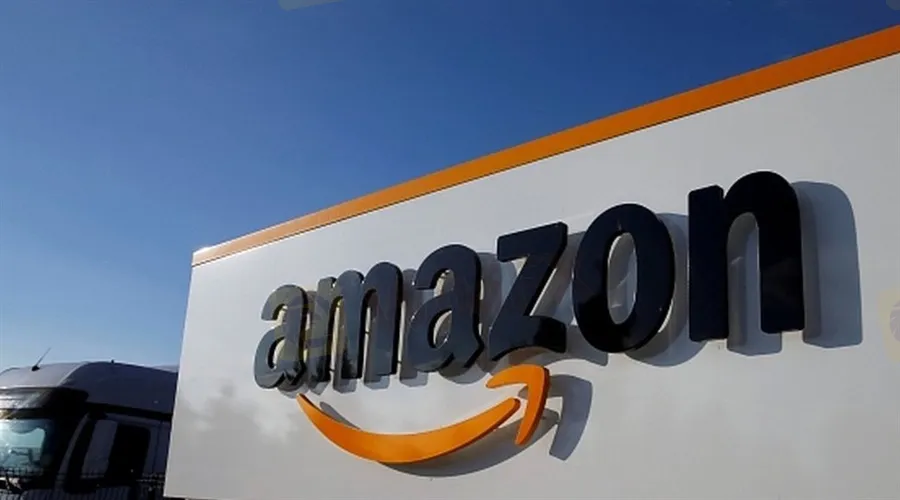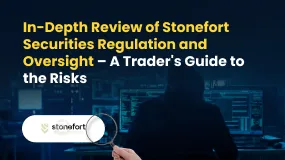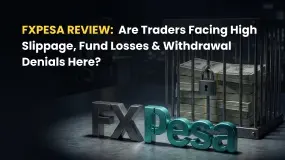简体中文
繁體中文
English
Pусский
日本語
ภาษาไทย
Tiếng Việt
Bahasa Indonesia
Español
हिन्दी
Filippiiniläinen
Français
Deutsch
Português
Türkçe
한국어
العربية
Esperio: Amazon Loses Less than Other Techs Amid Corporate Bonds Announcement
Abstract:The “wait and see” mood on the back of feeble corrective slopes in the market seems to be an appropriate investment stance for the current week, when “no deal” used as a safety bet might become the prevailing practice.

At least for a part of the market, corporate bonds may become a real alternative.
In Europe, the annualized consumer inflation indicator from Germany showed a fresh update at 7.3%, while average retail prices gained 2.5% on the monthly basis in March. Both figures are sounding alarms, so that another clear sign of fall in the value of money may call investors to convert more Euro-nominated funds into potentially rising market assets. The crowd is braced for a tense expectation of the European Central Bank's (ECB) hard effort to give or not to give initial hawkish clues at its meeting on April 14.
The leading European stock index futures are losing ground. The next psychological supports of 14,000 for the German Xetra DAX prices and 6,400 for the French CAC 40 are at the risk of surrendering then yielding the right-of-way to bears. Some members of the market who are always eager to buy dips are still present but they represent a tiny minority as the S&P 500 major indicator of Wall Street's touched below the 4,400 landmark.
The flagships of the market, Apple and Microsoft, dropped by 2.55% and 3.94%, respectively, with the iPhone-maker not attracting immediate safe-haven attention even at prices of about $165 per share, after the recent $180 zone, while Microsoft has been hit for a while after UBS estimated that Office 365, its second-biggest profit source, may see some slower growth ahead as the work from home trend is not so strong.
News of some cancellations for consumer graphics processing units (GPUs) with the coming fork for Ethereum cryptocurrency partially lowered demand which led Nvidia prices 5.2% lower to touch the area below $220 per share on Monday's close, although the semiconductors manufacturer was storming the $290 hill just at the end of March when its CEOs announced the placement of Nvidia's chip production on the facilities of its Intel rival soon.
The regular release from the U.S. Bureau of Labour Statistics with an anticipated new 40-year consumer price record of 8.4% rather throws the market into confusion, yet it does not encourage immediate action, while investors are torn between the opportunity to wait for some better moment on stocks or just invest in Treasury bonds. The decision is not so easy as bond yields are growing almost every day, “promising” to become a better investment tomorrow or even the day after tomorrow.
At least for a part of the market, corporate bonds may become a real alternative, a fact that has resurfaced after Amazon, the world's largest e-commerce platform, kicked off a seven-part investment-grade bond sale including its 40-year debt papers. Amazon wants to use the money to fund acquisitions to open new warehouses and even send broadband-streaming satellites into space, also sharing buybacks and repaying its previous debt as well. A 40-year security of Amazon may yield 1.55% over the U.S. public Treasuries, Reuters said according to “a person with knowledge of the matter”.
Amazons cash equivalents and marketable securities are now reportedly at their all-time high of $96 billion, but this is actually not a large sum compared with more than $1.5 trillion of its cap. Amazon's Q4 report set a record in terms of profit and revenue, and the company also announced a 20-to-1 stock split to attract smaller private investors. Amazon shares fell less than many other tech giants on Monday, losing only about 2% to remain above $3,000 per share.

Disclaimer:
The views in this article only represent the author's personal views, and do not constitute investment advice on this platform. This platform does not guarantee the accuracy, completeness and timeliness of the information in the article, and will not be liable for any loss caused by the use of or reliance on the information in the article.
Read more

In-Depth Uniglobe Markets Commission Fees and Spreads Analysis – What Traders Should Really Know
For experienced traders, the cost of execution is a critical factor in broker selection. Low spreads, fair commissions, and transparent pricing can be the difference between a profitable and a losing strategy over the long term. This has led many to scrutinize the offerings of brokers like Uniglobe Markets, which presents a tiered account structure promising competitive conditions. However, a professional evaluation demands more than a surface-level look at marketing claims. It requires a deep, data-driven analysis of the real trading costs, set against the backdrop of the broker's operational integrity and safety. This comprehensive Uniglobe Markets commission fees and spreads analysis will deconstruct the broker's pricing model, examining its account types, typical spreads, commission policies, and potential ancillary costs. Using data primarily sourced from the global broker inquiry platform WikiFX, we will provide a clear-eyed view of the Uniglobe Markets spreads commissions prici

In-Depth Review of Stonefort Securities Regulation and Oversight – A Trader's Guide to the Risks
For experienced traders, the process of selecting a new broker transcends a simple comparison of spreads and leverage. It is a meticulous due diligence exercise where the integrity of the broker's regulatory framework is paramount. Stonefort Securities, a relatively new entrant in the crowded brokerage space, presents a complex and often contradictory profile. On one hand, it boasts a modern MT5 platform and a stream of positive user testimonials. On the other hand, it is shadowed by severe regulatory warnings that question the very foundation of its operations. This in-depth review focuses on the core issue for any long-term trader: Stonefort Securities regulation and oversight. We will dissect the broker's corporate structure, scrutinize its licensing claims, and analyze what the data implies for trader protection and fund security. For traders evaluating whether Stonefort Securities is a trustworthy partner, understanding these details is not just important—it is essential.

FXPesa Review: Are Traders Facing High Slippage, Fund Losses & Withdrawal Denials?
Do FXPesa support officials fail to pick up your calls when you raise fund withdrawal requests with the broker? But are these officials always open to you regarding fund deposits? Do you frequently spot slippage and stop-loss order execution errors on the FXPesa login? These issues are increasingly becoming common with this forex broker. Consequently, many traders have expressed their dissatisfaction with the broker online. In this FXPesa Review article, we have shared some of these complaints. Take a look!

Trive Investigation: High Score, Hidden Risk - The Profit Paradox
A disturbing pattern has emerged regarding the broker Trive. Despite holding a high WikiFX score (7.91) and valid licenses in South Africa and Australia, recent investor reports suggest a significant disconnect between the platform's reputation and its treatment of profitable clients. While the regulatory paperwork appears in order, our data indicates that traders are facing sudden account freezes and accusations of "trading abuse" precisely when they attempt to withdraw profits. This report investigates why a seemingly "safe" broker is generating high-risk complaints.
WikiFX Broker
Latest News
WikiFX's New Evaluation of ATM Capital LTD: Does its License Protect the Arab Investor?
How a Fake Moomoo Ad Led to the “New Dream Voyage 5” Scam
Is Axi Legit? A Data-Driven Analysis of Its Regulatory Standing and Trader Feedback
FXPesa Review: Are Traders Facing High Slippage, Fund Losses & Withdrawal Denials?
Trive Investigation: High Score, Hidden Risk - The Profit Paradox
In-Depth Uniglobe Markets Commission Fees and Spreads Analysis – What Traders Should Really Know
Bessent believes there won't be a recession in 2026 but says some sectors are challenged
Is GGCC Legit? A Data-Driven Analysis for Experienced Traders
Young Singaporean Trader Grew USD 52 into a USD 107,700 Portfolio
In-Depth Review of INZO Trading Conditions and Product Offering – A Data-Driven Analysis
Currency Calculator




